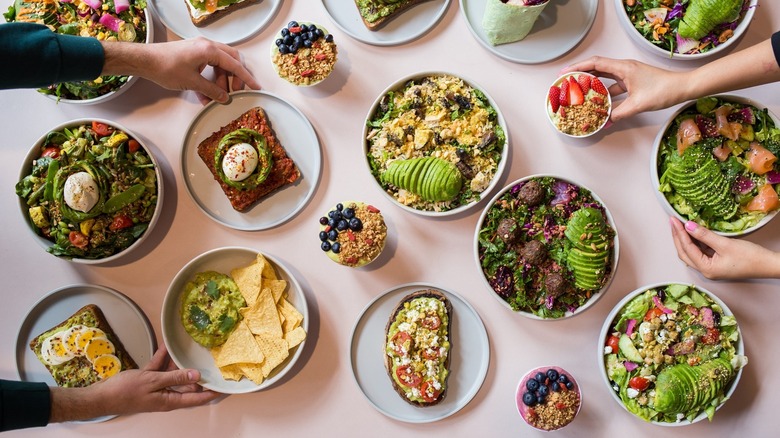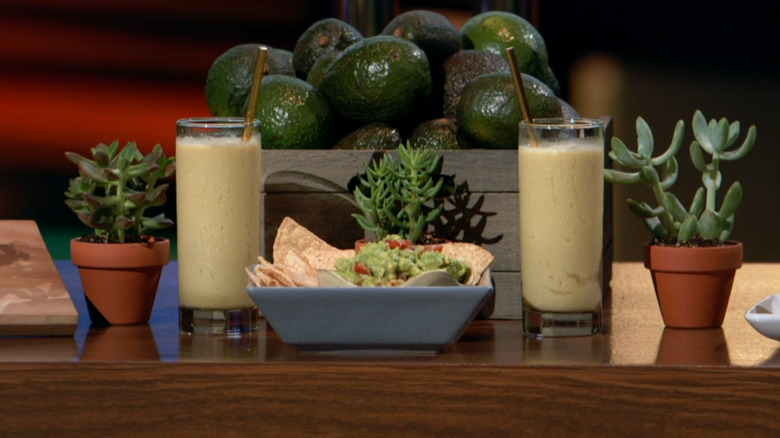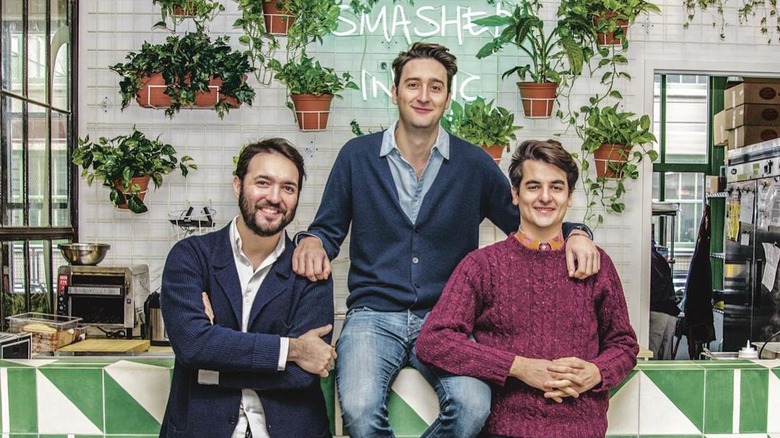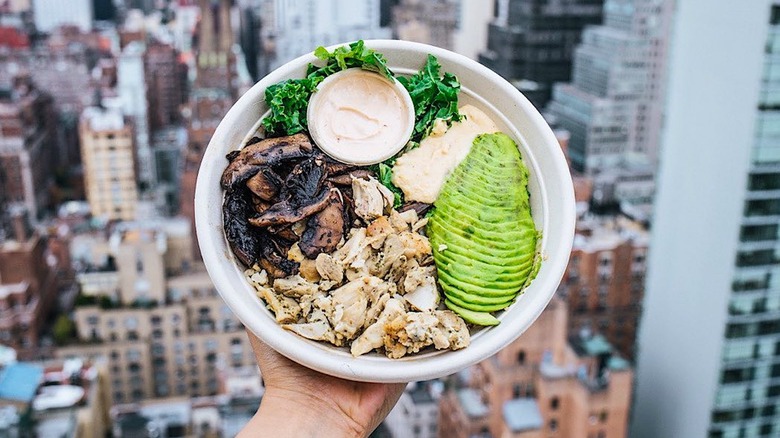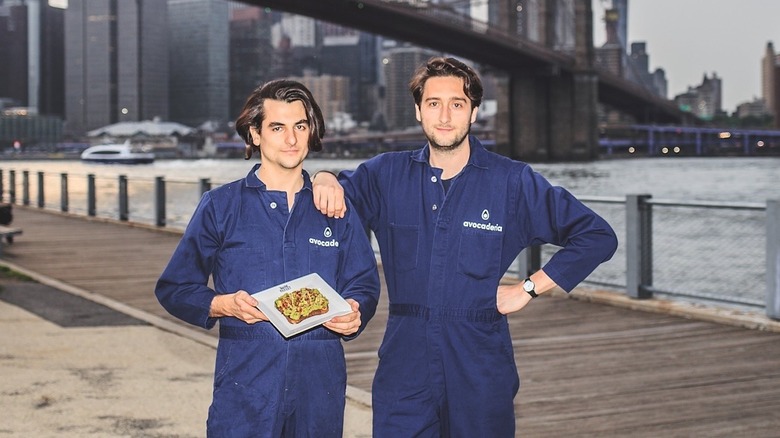Avocaderia: Here's What Happened After Shark Tank
We may receive a commission on purchases made from links.
Avocado sales have been booming in recent years: In 2022, the U.S. got through 2.7 billion pounds of the green fruit, versus just 436 million pounds in 1985 (per Statista). Back in 2017, spotting an opportunity offered by the continuing growth of the market, Francesco Brachetti, along with his chef cousin Alberto Gramini, and a friend, Alessandro Biggi, decided to open a New York eatery in a Brooklyn food hall with a menu dedicated solely to avocado-based meals. It capitalized on our obsession with avocado toast — a meal that even Salvador Dalí enjoyed – which Avocaderia sold for $11.45, as well as other options such as ceviche, smoothies, and desserts.
Billed as "the world's first avocado bar" (via Avo), Avo, formerly Avocaderia, started with a $70,000 investment that the trio of founders had secured via savings plus help from family and friends. A business idea that initially blossomed thanks to engagement on Instagram, the brick-and-mortar venue ran out of 200 avocados within the first three hours of trading. Within a year, the shop was making a profit.
In February 2018, Biggi appeared on season 9, episode 22 of "Shark Tank," hoping to grow the brand and to open in more locations. It certainly looked like a tasty prospect for investment; the month before the show was taped, Avocaderia made $75,000 in sales. So would any of the Sharks want to take a bite?
What happened to Avocaderia on Shark Tank?
Alessandro Biggi went on "Shark Tank" seeking a $300,000 investment in exchange for a 10% stake in the business. The aim, he said, was to open Avocaderia in 20 locations within the next five years. The business had already received around 50 requests for franchising by this point, as well as landing a six-figure deal for a cookbook, with the money being intended to open a second location in Chelsea.
Co-founder Biggi presented the Sharks with some sample dishes from Avocaderia, made using organically grown fruits from Mexico — the country that produces the most avocados in the world. These proved a hit with the potential investors in terms of taste, with Lori Greiner declaring the array of samples to be "very, very good" (via YouTube). Even so, she dropped out, citing a lack of enthusiasm for avocados — the same reason guest Shark Rohan Oza declined to invest.
Once Robert Herjavec had dropped out, Barbara Cocoran and Mark Cuban joined together to offer the $300,000 Avocaderia was asking for, but the duo wanted 25% of the company in return. Biggi countered with 15%, which the Sharks rejected. The company co-founder then suggested $400,000 for 20% — so the equivalent of $200,000 each for a 10% stake. The two Sharks agreed, and the deal was made.
Avocaderia after Shark Tank
In May 2018, three months after the episode of "Shark Tank" aired, Avocaderia went ahead and opened its second branch, located in Manhattan's Chelsea neighborhood. Within two hours of opening, it was already filled with customers, demonstrating the popularity of the nutritious fast food concept. That year, following the show and the new opening, the business had a valuation of $2 million, according to CNBC.
Avocaderia seemed to find ways to deal with potential pitfalls, too. Co-founder Francesco Brachetti admitted that the seasonal nature of avocados meant price fluctuations for the business, variations in demand, and even occasional shortages of the fruit. In a Bloomberg Quicktake video in 2018, he said that these potential rises in price would be absorbed by the business — not be passed on to the customer. The business partners also had to learn about how to ripen avocados faster or slow the process down when necessary – an important factor to consider when the Brooklyn branch alone was getting through 3,000 pounds of the fruit each month.
However, it appears that Avocaderia actually decided against working with the Sharks in the end, despite the impressive deal they secured and all the publicity it generated. "We would have had to give up too much control, so we decided to grow it ourselves," co-founder Alessandro Biggi told the New York Post.
Is Avocaderia still in business?
Avocaderia is still in business and has continued with its expansion plans. It now has five stores in New York, based in Brooklyn, Chelsea, Midtown East and West, and Nomad, mainly centered around nutritious and satisfying takeout options. The menu is ever evolving, offering everything from avocado grain bowls and salads to sandwiches and smoothies.
Avocaderia's cookbook, "Avocaderia: Avocado Recipes for a Healthier, Happier Life," was published in 2018 and is still available for sale. Recipes in the book include the likes of guac-fried tots with pico de gallo, avocado-lime cheesecake, and even a version of Stanley Tucci's favorite pasta dish, zucchini spaghetti – though Avocaderia's version, perhaps unsurprisingly, is served with an avocado pesto, too. The business has also continued to diversify. In 2022, that included launching a mobile avocado breakfast cart, as well as a range of themed merchandise.
And the company still engages with and shares news with customers via social media, the place where it first started to take off in the very beginning. It has almost 65,000 followers on Instagram – where it regularly posts colorful content showcasing its attractive dishes — plus 38,000 followers on Facebook. It is also active on TikTok, posting videos showing behind-the-scenes footage from photoshoots or the making of dishes.
What's next for Avocaderia?
By 2023, Avocaderia was bringing in around $2.5 million a year, and employed 45 people across its branches (per the New York Post). It doesn't show any signs of slowing down and, in fact, has begun to embrace a new sense of purpose and adaptability as it matures.
At the end of 2023, Avocaderia changed its name to Avo. The simpler new name and branding are a sign of the future direction for the company, which admits it's "done some growing up" since it first launched in Brooklyn (via Avo). Taking on board customer feedback, the company has begun to offer a more seasonally-focused menu, with salads and bowls that are customizable and cater to a range of dietary requirements and preferences.
Not every dish even features the green fruit as the star anymore. New bowls showcase other wholesome ingredients, such as oven-roasted salmon, or burrata with housemade pesto. The change of direction is paying off. Avo made Fast Casual's Top 100 Movers & Shakers list in the summer of 2024, and the possibilities for expansion, both in terms of new locations and different culinary offerings, look limitless. This just goes to show that there's so much more to avocado than toast.

